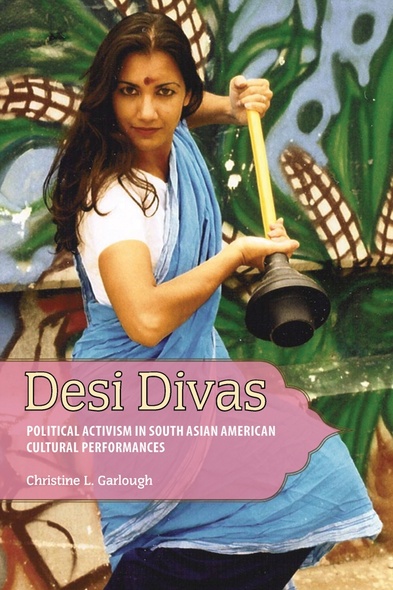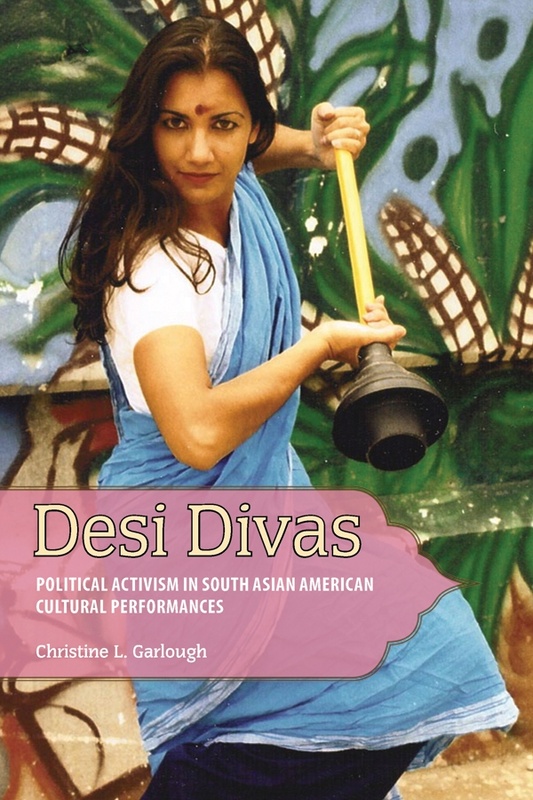Our shopping cart is currently down. To place an order, please contact our distributor, UTP Distribution, directly at utpbooks@utpress.utoronto.ca.

Desi Divas
Political Activism in South Asian American Cultural Performances
Desi Divas: Political Activism in South Asian American Cultural Performances is the product of five years of field research with progressive activists associated with the School for Indian Languages and Cultures (SILC), South Asian Americans Leading Together (SAALT), the feminist dance collective Post Natyam, and the grassroots feminist political organization South Asian Sisters. Christine L. Garlough explores how traditional cultural forms may be critically appropriated by marginalized groups and used as rhetorical tools to promote deliberation and debate, spur understanding and connection, broaden political engagement, and advance particular social identities. Within this framework she examines how these performance activists advocate a political commitment to both justice and care, to both deliberative discussion and deeper understanding. To consider how this might happen in diasporic performance contexts, Garlough weaves together two lines of thinking. One grows from feminist theory and draws upon a core literature concerning the ethics of care. The other comes from rhetoric, philosophy, and political science literature on recognition and acknowledgment. This dual approach is used to reflect upon South Asian American women’s performances that address pressing social problems related to gender inequality, immigration rights, ethnic stereotyping, hate crimes, and religious violence.
Case study chapters address the relatively unknown history of South Asian American rhetorical performances from the early 1800s to the present. Avant-garde feminist performances by the Post Natyam dance collective appropriate women’s folk practices and Hindu goddess figures make rhetorical claims about hate crimes against South Asian Americans after 9/11. In Yoni ki Bat (a South Asian American version of The Vagina Monologues) a progressive performer transforms aspects of the Mahabharata narrative to address issues of sexual violence, such as incest and rape. Throughout the volume, Garlough argues that these performers rely on calls for acknowledgment that intertwine calls for justice and care. That is, they embed their testimony in traditional cultural forms to invite interest, reflection, and connection.
Christine L. Garlough’s monograph is an important and timely study of the critical role of performance in effecting social change. . . . Garlough creates a rich and hitherto untold narrative that champions the transformative power of community theatre, interweaving conceptual frameworks from feminist theory, folklore, and communication studies against a powerful contextual backdrop of American attitudes towards South Asian immigrants.
Christine Garlough’s Desi Divas is an intelligent and sensitive examination of South Asian women using performances of acknowledgement and caring to address their cultural exploitation. By coupling ethnographic and critical methods, she offers a ground-level view that captures inequalities of gender and denial of human rights and the lived practices within a non-Western perspective that combat them. Her deft intersection of theory and method currently informing research in folklore, performance, and vernacular rhetoric is a timely contribution to the liveliest issues currently animating humanistic research. Garlough provides a model for interdisciplinary critical cultural scholarship and its capacity to open our view to what lies behind the gentle violence of everyday life.
Christine Garlough’s original scholarship and interdisciplinary approach augments feminist and drama scholarship on how political performances work towards social justice, and even social change. Such performances, argues Desi Divas, play a vital role in activist work that ‘creates opportunities’ in Garlough’s words, ‘for ethical listening and the possibility of social action on the part of diverse audiences.' Garlough effectively explores a wholly original idea: namely, the ethics and politics of care as ‘a critical social practice . . . a communicative effort that encourages a sense of connection and compassion.' Desi Divas is a compelling text for scholars of feminist theory, ethnic studies, South Asian studies, performance studies, and diaspora studies.
Christine L. Garlough is professor of gender and women’s studies at University of Wisconsin–Madison and director of the Center for Research on Gender and Women.




